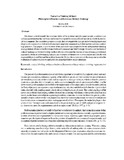Towards a thinking military philosophical practice and Botswana military training
| dc.contributor.author | Ikpe, I. | |
| dc.date.accessioned | 2011-05-19T10:19:20Z | |
| dc.date.available | 2011-05-19T10:19:20Z | |
| dc.date.issued | 2011 | |
| dc.identifier.citation | Ikpe, I. (2011) Towards a thinking military philosophical practice and Botswana military training, Philosophical Practice: Journal of the APPA, Vol. 6, No. 1, pp. 722-33 | en_US |
| dc.identifier.issn | 1742-8173 | |
| dc.identifier.uri | http://hdl.handle.net/10311/795 | |
| dc.description.abstract | Obedience is traditionally the supreme virtue of the military and, for many people, a soldier is an unthinking automaton that has been conditioned to respond to commands and operate in strictly hierarchical environments. But as soldiers progress in rank, they are required to distinguish between legitimate and illegitimate commands as well as to reason concerning their commands and other military and non-military engagements. This paper is an overview of the practical steps adopted to foster independent thinking among student officers at the Botswana Defence Command and Staff College. It shows how the tools of critical thinking can be used to help student officers overcome the lessons of unquestioning obedience ingrained in them at cadet training and gain an awareness of themselves as autonomous individuals with responsibilities to and beyond the military hierarchy. It also shows how critical thinking can assist in the evaluation of military objectives and in the decisions that follow such evaluations. | en_US |
| dc.language.iso | en | en_US |
| dc.publisher | Taylor & Francis | en_US |
| dc.subject | critical thinking | en_US |
| dc.subject | military obedience | en_US |
| dc.subject | Botswana military | en_US |
| dc.subject | military training | en_US |
| dc.subject | regimentation | en_US |
| dc.title | Towards a thinking military philosophical practice and Botswana military training | en_US |
| dc.type | Published Article | en_US |

